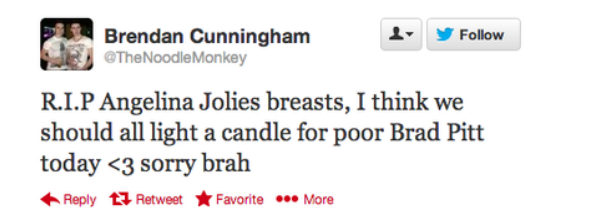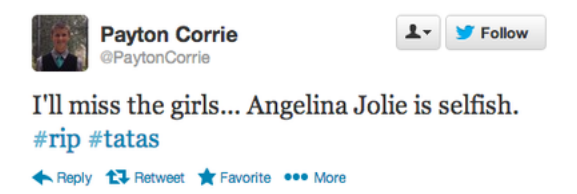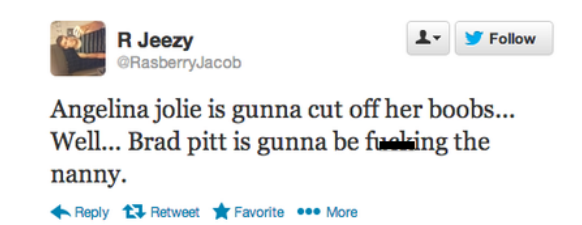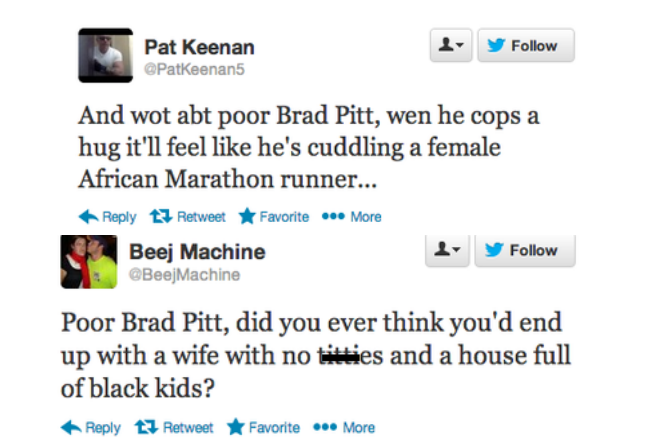by Anya Josephs
Recently, Angelina Jolie wrote a pretty interesting op-ed about her decision to have a preventative double mastectomy. The surgeries she had took several months and were painful and expensive, but not nearly as painful as having life-threatening breast cancer. Without this surgery, she would have had an 87% chance of developing breast cancer. With it, her chances are less than 5%, substantially less than the chances for even the average American woman.
There are definitely some issues with her statement. When I talked about this with my dad, a medical doctor, he brought up the possibility of false-positive results (when the test for the genetic defect Angelina Jolie has, on the BRCA1 gene, shows a positive result but the person being tested doesn’t actually have the gene) as well as ambiguous results, which can happen in about 10% of tests. The surgery is definitely not without risks, and it’s important for women to talk about it with their doctors before making the choice to even be tested, much less have a surgical intervention. After reading her article, my father felt it wasn’t clear enough that what Ms. Jolie decided was right for her might not be right for other women. (I don’t necessarily agree with him, but I do see where he’s coming from).
There’s also the issue of medical costs. She addresses this only briefly in her op-ed, and several commenters mention the fact that her decision to have the surgery comes from a place of huge privilege. She had multiple expensive surgeries, which may or may not have been covered by insurance—if one even has insurance. The $3000 price tag for testing alone is, as she says, an obstacle for many women. Many women don’t have a supportive partner—or one who can afford to be present for “every minute of the surgeries.” There are plenty of women who would struggle to even find the time to take off work themselves.
So, definitely, Ms. Jolie’s statement is one that should—even one that is intended to—spark a dialogue.

But not like this. A huge amount of the discussion that’s cropped up in the wake of Ms. Jolie’s decision to go public about her mastectomy has been in the fashion of the tweet above—there are literally thousands of tweets mourning the loss of her breasts. This is just another manifestation of the phenomenon I talked about in the ridiculously sexist Oscars boob song: women, no matter the context, are reduced to their most sexualized body parts.
I’m sure it’s very hard for Ms. Jolie to lose both her breasts. The surgery sounds difficult and painful, and grieving over the loss of a body part is totally normal. This tweeter, though, is talking about her breasts in a pretty seriously creepy way. She isn’t mentioned at all in this tweet, just her breasts, and her husband. The excessive focus on sexualized body parts is leading directly to the dehumanization and objectification of women. This guy, who I feel pretty safe in assuming has never met Ms. Jolie, doesn’t really have any right to have an opinion on her breasts or her relationship. In her article, Ms. Jolie stated that Brad Pitt had been “so loving and supportive.” I assume that means being happy that his partner wasn’t going to die from breast cancer rather than sulking because her breasts were gone. In an interview with the Guardian, he called her choice “absolutely heroic” and said that all he wanted was for her to have “a long and happy life.” It’s only this random dude with a twitter account—and plenty of other people (mostly men) like him—who think an attractive woman’s breasts are more important than her life.

I mean, how dare a grown woman make the unspeakably selfish decision to have surgery to avoid the near-certainty of cancer? Let’s all be aghast at her following a physician’s advice to avoid getting the disease that killed her mother. The sheer audacity of valuing the ability to “tell [her] children that they don’t need to fear they will lose [her] to breast cancer” over some random guy’s enjoyment in looking at her breasts? And it goes on—people are stating, and actively hoping, that her husband will cheat on her.

Not to mention the weird racist overtones lots of these tweets have, attacking her for no longer conforming to the (white, thin) standard of beauty and for valuing her (multiracial, some adopted) children over other people’s objectification of her body.

To be honest, before all this happened, I didn’t really care about Angelina Jolie or Brad Pitt. I’ve never been particularly invested in celebrity culture, I don’t watch a lot of movies, I’m just not that invested in the lives of people I’ve never met. But the kind of rhetoric that’s taking place around Ms. Jolie’s decision to get a mastectomy—the kind of unmitigated hate that’s being leveled at a woman who only wanted to be able to watch her kids grow up—speaks to way more than this one situation. It shows the sheer amount of entitlement people feel to women’s bodies. The people—and again, they’re almost all men—tweeting about Angelina Jolie’s mastectomy think that their appreciation of her body trumps her health and even her life. They can’t imagine the possibility that her partner is more concerned with her well-being than her breasts. They’re representing an attitude—a surprisingly prevalant, worryingly aggressive attitude—where a woman’s breasts are more valuable than her life.

Pointless. Because without breasts, without conforming to a standard of physical attractiveness for the appreciation of a specific man or men in general, women are apparently pointless.
I don’t care much for celebrity gossip, but I absolutely care about that belief—that despite winning an Oscar, raising children, volunteering for the UN, and everything else, Angelina Jolie is pointless if she doesn’t have breasts. Apparently, nothing a woman does has any meaning if she isn’t sexually attractive.
I’m sure choosing between her breasts and the elevated risk of cancer was a hard choice for Ms. Jolie, but I am baffled and angered that so many people seem to believe it was the wrong one. These tweets represent the effects of our culture of sexualization and objectification, taken to the maximum—a culture where valuing your life more than the male gaze is “selfish,” where a woman who no longer conforms to the beauty standard is doomed to have an unhappy, cheating husband, where a woman without breasts might as well be dead because if no one is getting the pleasure of objectifying her, she is “pointless.”
What an incredibly well written piece. Thank you for taking the time to speak out on such a crucial issue. This public reaction is unacceptable and shameful and your piece highlights the important dialogue we need to be having with our boys and our girls, young and old. Fantastic job!
I had a mastectomy in 2012 to rid my body of breast cancer. The man I was married to at the time left me. His mindset was as small as the examples of the men in this article. I remained breastless for a year, during which time I began dating. I knew most men were exactly like these men, so you can imagine my fear at the very thought of having to tell a man I only had one breast. A wonderful man came into my life and the day came when not only did I tell him, but he was going to see my bare chest. He didn’t wince when I took off my clothes. He fell in love with me. And accepted my scars. My “imperfection”. I got reconstruction a year ago, but a second tumor showed up. Everything was removed from my right side again. I endured radiation this time. And reconstruction is way down the line for me. If ever. I’m engaged to this same man who says I’m back to the way I was when he met me. I know he loves me. But I fight voices every single day that tell me I am a freak. Just last night we were watching a movie on TV that objectified women. Made them a pair of t**s. And I don’t have a PAIR. Over and over again in an hour and a half perfect, oversized, fake breasts were shoved in our faces. I sat on my couch and began to feel less and less like a woman with ever flash of bare t***ies. It’s not just that the actresses exposed their breasts. They made a seductive striptease out of undressing. So we go off to bed. My fiancé lay in the bed with the light on, and when I began to take my sports bra off over my head all I could think of is how ugly I am. How unsexy this must look to him after the images the media heaped on us during the evening. I can’t be the image. Women have been reduced to being nothing more than body parts. And when you don’t have the parts- then you become nothing in a mans eyes. In society’s eyes. This is a cause worth fighting for. I’m so thankful for your voices.